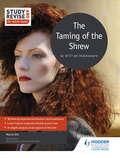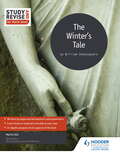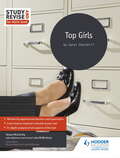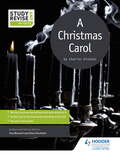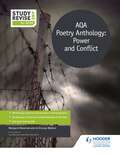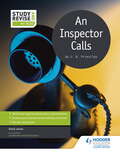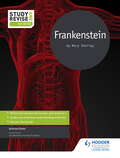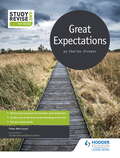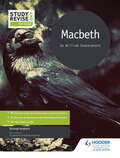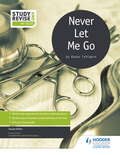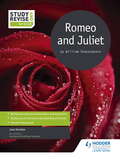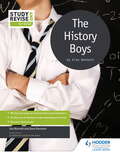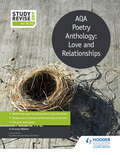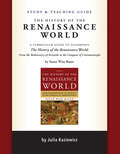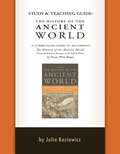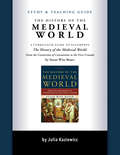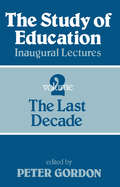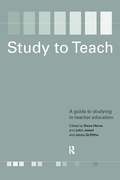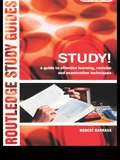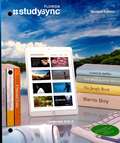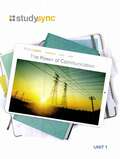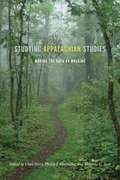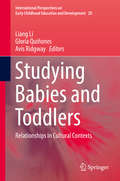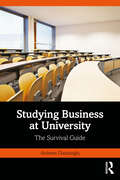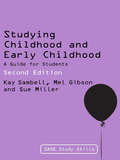- Table View
- List View
Study and Revise for AS/A-level: The Taming of the Shrew
by Nicola Onyett Martin Old Luke McBratneyEnable students to achieve their best grade in AS/A-level English Literature with this year-round course companion; designed to instil in-depth textual understanding as students read, analyse and revise The Taming of the Shrew throughout the course.This Study and Revise guide:- Increases students' knowledge of The Taming of the Shrew as they progress through the detailed commentary and contextual information written by experienced teachers and examiners- Develops understanding of characterisation, themes, form, structure and language, equipping students with a rich bank of textual examples to enhance their coursework and exam responses- Builds critical and analytical skills through challenging, thought-provoking questions and tasks that encourage students to form their own personal responses to the text- Extends learning and prepares students for higher-level study by introducing critical viewpoints, comparative references to other literary works and suggestions for independent research- Helps students maximise their exam potential using clear explanations of the Assessment Objectives, sample student answers and examiner insights- Improves students' extended writing techniques through targeted advice on planning and structuring a successful essay
Study and Revise for AS/A-level: The Winter's Tale By William Shakespeare
by Martin OldEnable students to achieve their best grade in AS/A-level English Literature with this year-round course companion; designed to instil in-depth textual understanding as students read, analyse and revise The Winter's Tale throughout the course.This Study and Revise guide:- Increases students' knowledge of The Winter's Tale as they progress through the detailed commentary and contextual information written by experienced teachers and examiners- Develops understanding of characterisation, themes, form, structure and language, equipping students with a rich bank of textual examples to enhance their coursework and exam responses- Builds critical and analytical skills through challenging, thought-provoking questions and tasks that encourage students to form their own personal responses to the text- Extends learning and prepares students for higher-level study by introducing critical viewpoints, comparative references to other literary works and suggestions for independent research- Helps students maximise their exam potential using clear explanations of the Assessment Objectives, sample student answers and examiner insights- Improves students' extended writing techniques through targeted advice on planning and structuring a successful essay
Study and Revise for AS/A-level: Top Girls
by Shaun McCarthy Luke McBratneyEnable students to achieve their best grade in AS/A-level English Literature with this year-round course companion; designed to instil in-depth textual understanding as students read, analyse and revise Top Girls throughout the course.This Study and Revise guide:- Increases students' knowledge of Top Girls as they progress through the detailed commentary and contextual information written by experienced teachers and examiners- Develops understanding of characterisation, themes, form, structure and language, equipping students with a rich bank of textual examples to enhance their coursework and exam responses- Builds critical and analytical skills through challenging, thought-provoking questions and tasks that encourage students to form their own personal responses to the text- Extends learning and prepares students for higher-level study by introducing critical viewpoints, comparative references to other literary works and suggestions for independent research- Helps students maximise their exam potential using clear explanations of the Assessment Objectives, sample student answers and examiner insights- Improves students' extended writing techniques through targeted advice on planning and structuring a successful essay
Study and Revise for GCSE: A Christmas Carol
by Sue BennettExam Board: AQA, Edexcel, OCR, WJEC, WJEC EduqasLevel: GCSE (9-1)Subject: English LiteratureFirst teaching: September 2015First Exams: Summer 2017Enable students to achieve their best grade in GCSE English Literature with this year-round course companion; designed to instil in-depth textual understanding as students read, analyse and revise A Christmas Carol throughout the course.This Study and Revise guide:- Increases students' knowledge of A Christmas Carol as they progress through the detailed commentary and contextual information written by experienced teachers and examiners- Develops understanding of plot, characterisation, themes and language, equipping students with a rich bank of textual examples to enhance their exam responses- Builds critical and analytical skills through challenging, thought-provoking questions that encourage students to form their own personal responses to the text- Helps students maximise their exam potential using clear explanations of the Assessment Objectives, annotated sample student answers and tips for reaching the next grade- Improves students' extended writing techniques through targeted advice on planning and structuring a successful essay- Provides opportunities for students to review their learning and identify their revision needs with knowledge-based questions at the end of each chapter
Study and Revise for GCSE: AQA Poetry Anthology: Power and Conflict
by Margaret Newman Jo Gracey-WalkerExam Board: AQALevel: GCSE (9-1)Subject: English literatureFirst teaching: September 2015First exams: Summer 2017Enable students to achieve their best grade in GCSE English Literature with this year-round course companion; designed to instil in-depth textual understanding as students read, analyse and revise the AQA Poetry Anthology: Power and Conflict throughout the course.This Study and Revise guide:- Increases students' knowledge of the AQA Poetry Anthology: Power and Conflict as they progress through the detailed commentary and contextual information written by experienced teachers and examiners- Develops understanding of plot, characterisation, themes and language, equipping students with a rich bank of textual examples to enhance their exam responses- Builds critical and analytical skills through challenging, thought-provoking questions that encourage students to form their own personal responses to the text- Helps students maximise their exam potential using clear explanations of the Assessment Objectives, annotated sample student answers and tips for reaching the next grade- Improves students' extended writing techniques through targeted advice on planning and structuring a successful essay- Provides opportunities for students to review their learning and identify their revision needs with knowledge-based questions at the end of each chapter
Study and Revise for GCSE: An Inspector Calls
by David Arthur JamesExam Board: AQA, OCR, Edexcel, WJEC, WJEC Eduqas, CCEALevel: GCSE (9-1)Subject: English LiteratureFirst teaching: September 2015First exams: Summer 2017Enable students to achieve their best grade in GCSE English Literature with this year-round course companion; designed to instil in-depth textual understanding as students read, analyse and revise An Inspector Calls throughout the course.This Study and Revise guide:- Increases students' knowledge of An Inspector Calls as they progress through the detailed commentary and contextual information written by experienced teachers and examiners- Develops understanding of plot, characterisation, themes and language, equipping students with a rich bank of textual examples to enhance their exam responses- Builds critical and analytical skills through challenging, thought-provoking questions that encourage students to form their own personal responses to the text- Helps students maximise their exam potential using clear explanations of the Assessment Objectives, annotated sample student answers and tips for reaching the next grade- Improves students' extended writing techniques through targeted advice on planning and structuring a successful essay- Provides opportunities for students to review their learning and identify their revision needs with knowledge-based questions at the end of each chapter
Study and Revise for GCSE: Frankenstein
by Andrew GreenExam Board: AQA, EdexcelLevel: GCSE (9-1)Subject: English LiteratureFirst teaching: September 2015First exams: Summer 2017Enable students to achieve their best grade in GCSE English Literature with this year-round course companion; designed to instil in-depth textual understanding as students read, analyse and revise Frankenstein throughout the course.This Study and Revise guide:- Increases students' knowledge of Frankenstein as they progress through the detailed commentary and contextual information written by experienced teachers and examiners- Develops understanding of plot, characterisation, themes and language, equipping students with a rich bank of textual examples to enhance their exam responses- Builds critical and analytical skills through challenging, thought-provoking questions that encourage students to form their own personal responses to the text- Helps students maximise their exam potential using clear explanations of the Assessment Objectives, annotated sample student answers and tips for reaching the next grade- Improves students' extended writing techniques through targeted advice on planning and structuring a successful essay- Provides opportunities for students to review their learning and identify their revision needs with knowledge-based questions at the end of each chapter
Study and Revise for GCSE: Great Expectations
by Peter MorrissonExam Board: AQA, OCR, EdexcelLevel: GCSE (9-1)Subject: English LiteratureFirst teaching: September 2015First exams: Summer 2017Enable students to achieve their best grade in GCSE English Literature with this year-round course companion; designed to instil in-depth textual understanding as students read, analyse and revise Great Expectations throughout the course.This Study and Revise guide:- Increases students' knowledge of Great Expectations as they progress through the detailed commentary and contextual information written by experienced teachers and examiners- Develops understanding of plot, characterisation, themes and language, equipping students with a rich bank of textual examples to enhance their exam responses- Builds critical and analytical skills through challenging, thought-provoking questions that encourage students to form their own personal responses to the text- Helps students maximise their exam potential using clear explanations of the Assessment Objectives, annotated sample student answers and tips for reaching the next grade- Improves students' extended writing techniques through targeted advice on planning and structuring a successful essay- Provides opportunities for students to review their learning and identify their revision needs with knowledge-based questions at the end of each chapter
Study and Revise for GCSE: Macbeth
by Shelagh HubbardExam Board: AQA, OCR, Edexcel, WJEC EduqasLevel: GCSE (9-1)Subject: English literatureFirst teaching: September 2015First exams: Summer 2017Enable students to achieve their best grade in GCSE English Literature with this year-round course companion; designed to instil in-depth textual understanding as students read, analyse and revise Macbeth throughout the course.This Study and Revise guide:- Increases students' knowledge of Macbeth as they progress through the detailed commentary and contextual information written by experienced teachers and examiners- Develops understanding of plot, characterisation, themes and language, equipping students with a rich bank of textual examples to enhance their exam responses- Builds critical and analytical skills through challenging, thought-provoking questions that encourage students to form their own personal responses to the text- Helps students maximise their exam potential using clear explanations of the Assessment Objectives, annotated sample student answers and tips for reaching the next grade- Improves students' extended writing techniques through targeted advice on planning and structuring a successful essay- Provides opportunities for students to review their learning and identify their revision needs with knowledge-based questions at the end of each chapter
Study and Revise for GCSE: Never Let Me Go
by Sue Bennett Dave Stockwin Susan ElkinExam Board: AQA, OCR, WJEC, WJEC EduqasLevel: GCSE (9-1)Subject: English literatureFirst teaching: September 2015First exams: Summer 2017Enable students to achieve their best grade in GCSE English Literature with this year-round course companion; designed to instil in-depth textual understanding as students read, analyse and revise Never Let Me Go throughout the course.This Study and Revise guide:- Increases students' knowledge of Never Let Me Go as they progress through the detailed commentary and contextual information written by experienced teachers and examiners- Develops understanding of plot, characterisation, themes and language, equipping students with a rich bank of textual examples to enhance their exam responses- Builds critical and analytical skills through challenging, thought-provoking questions that encourage students to form their own personal responses to the text- Helps students maximise their exam potential using clear explanations of the Assessment Objectives, annotated sample student answers and tips for reaching the next grade- Improves students' extended writing techniques through targeted advice on planning and structuring a successful essay- Provides opportunities for students to review their learning and identify their revision needs with knowledge-based questions at the end of each chapter
Study and Revise for GCSE: Romeo and Juliet
by Jane SheldonExam Board: AQA, OCR, Edexcel, WJEC EduqasLevel: GCSE (9-1)Subject: English literatureFirst teaching: September 2015First exams: Summer 2017Enable students to achieve their best grade in GCSE English Literature with this year-round course companion; designed to instil in-depth textual understanding as students read, analyse and revise Romeo and Juliet throughout the course.This Study and Revise guide:- Increases students' knowledge of Romeo and Juliet as they progress through the detailed commentary and contextual information written by experienced teachers and examiners- Develops understanding of plot, characterisation, themes and language, equipping students with a rich bank of textual examples to enhance their exam responses- Builds critical and analytical skills through challenging, thought-provoking questions that encourage students to form their own personal responses to the text- Helps students maximise their exam potential using clear explanations of the Assessment Objectives, annotated sample student answers and tips for reaching the next grade- Improves students' extended writing techniques through targeted advice on planning and structuring a successful essay- Provides opportunities for students to review their learning and identify their revision needs with knowledge-based questions at the end of each chapter
Study and Revise for GCSE: The History Boys
by Sue Bennett Dave StockwinExam Board: AQA, WJEC, WJEC EduqasLevel: GCSE (9-1)Subject: English literatureFirst teaching: September 2015First exams: Summer 2017Enable students to achieve their best grade in GCSE English Literature with this year-round course companion; designed to instil in-depth textual understanding as students read, analyse and revise The History Boys throughout the course.This Study and Revise guide:- Increases students' knowledge of The History Boys as they progress through the detailed commentary and contextual information written by experienced teachers and examiners- Develops understanding of plot, characterisation, themes and language, equipping students with a rich bank of textual examples to enhance their exam responses- Builds critical and analytical skills through challenging, thought-provoking questions that encourage students to form their own personal responses to the text- Helps students maximise their exam potential using clear explanations of the Assessment Objectives, annotated sample student answers and tips for reaching the next grade- Improves students' extended writing techniques through targeted advice on planning and structuring a successful essay- Provides opportunities for students to review their learning and identify their revision needs with knowledge-based questions at the end of each chapter
Study and Revise: Aqa Poetry Anthology : Love And Relationships
by Jo Gracey-WalkerExam Board: AQALevel: GCSE (9-1)Subject: English literatureFirst teaching: September 2015First exams: Summer 2017Enable students to achieve their best grade in GCSE English Literature with this year-round course companion; designed to instil in-depth textual understanding as students read, analyse and revise the AQA Poetry Anthology: Love and Relationships throughout the course.This Study and Revise guide:- Increases students' knowledge of the AQA Poetry Anthology: Love and Relationships as they progress through the detailed commentary and contextual information written by experienced teachers and examiners- Develops understanding of plot, characterisation, themes and language, equipping students with a rich bank of textual examples to enhance their exam responses- Builds critical and analytical skills through challenging, thought-provoking questions that encourage students to form their own personal responses to the text- Helps students maximise their exam potential using clear explanations of the Assessment Objectives, annotated sample student answers and tips for reaching the next grade- Improves students' extended writing techniques through targeted advice on planning and structuring a successful essay- Provides opportunities for students to review their learning and identify their revision needs with knowledge-based questions at the end of each chapter
Study and Teaching Guide for The History of the Renaissance World
by Susan Wise Bauer Julia Kaziewicz Madelaine Wheeler Sarah ParkTurn Susan Wise Bauer's The History of the Renaissance World into a high-school history course. Susan Wise Bauer’s narrative world history series is widely used in advanced high school history classes, as well as by home educating parents. The Study and Teaching Guide, designed for use by both parents and teachers, provides a full high-school-level curriculum in late medieval-early Renaissance history. It includes: Study questions and answers Critical thinking assignments Map exercises Essay topics and instructor grading rubrics Teaching tips and explanations for answers The Study and Teaching Guide, designed by historian and teacher Julia Kaziewicz in cooperation with Susan Wise Bauer, makes The History of the Renaissance World even more accessible to educators and parents alike.
Study and Teaching Guide: The History of the Ancient World
by Julia KaziewiczA curriculum guide to accompany The History of the Ancient World: From the Earliest Accounts to the Fall of Rome, by Susan Wise Bauer. Susan Wise Bauer's narrative world history series is widely used in advanced high school history classes, as well as by home educating parents. The Study and Teaching Guide, designed for use by both parents and teachers, provides a full curriculum with study questions and answers, critical thinking assignments, essay topics, instructor rubrics, and test forms. Explanations for answers and teaching tips are also included. The Study and Teaching Guide, designed by historian and teacher Julia Kaziewicz in cooperation with Susan Wise Bauer, makes The History of the Ancient World (recommended for high school study in The Well-Trained Mind: A Guide to Classical Education at Home) even more accessible to educators and parents alike.
Study and Teaching Guide: The History of the Medieval World
by Julia KaziewiczA curriculum guide to accompany The History of the Medieval World: From the Conversion of Constantine to the First Crusade, by Susan Wise Bauer. Susan Wise Bauer’s narrative world history series is widely used in advanced high school history classes, as well as by home educating parents. The Study and Teaching Guide, designed for use by both parents and teachers, provides a full curriculum with study questions and answers, critical thinking assignments, essay topics, instructor rubrics, and test forms. Explanations for answers and teaching tips are also included. The Study and Teaching Guide, designed by historian and teacher Julia Kaziewicz in cooperation with Susan Wise Bauer, makes The History of the Medieval World even more accessible to educators and parents alike.
Study of Education Pb: A Collection of Inaugural Lectures (Volume 1 and 2)
by Peter GordonFirst published in 1980. Routledge is an imprint of Taylor & Francis, an informa company.
Study to Teach: A Guide to Studying in Teacher Education
by Steve Herne John Jessel Jenny GriffithsFor all those preparing to teach or involved in further professional development it will provide an essential, accessible and readable companion to their course. Theories of learning are integrated with practical strategies for approaching a topic. Each of the following areas discussed: *active reading and using the library *referencing correctly *making notes and writing clearly *presenting your work orally *developing subject knowledge *using information and communications technology *continuing professional development *developing key relationships *partnerships between schools and universities. The book explores the process of getting to know yourself as a learner and the nature of knowledge and understanding. A useful and comprehensive introduction to research identifies and demystifies aspects more relevant to the education student. Each chapter is written by professional educators with a wide range of experience and expertise.
Study!: A Guide to Effective Learning, Revision and Examination Techniques
by Robert BarrassWhether entering higher education straight from school, or returning to study later in life, students need to develop effective study skills to get the most out of a course. Whatever the subject, this book will help to achieve the aims of the student by offering practical advice and useful techniques for successful study. These skills are not always taught as part of courses because of time restriction, but with an increased performance emphasis for lecturers they are vital to the success of the course. In addition to this with more and more people returning to education and undergoing Continuing Professional Development the audience for this book is growing rapidly. The book covers three main areas: * accepting responsibility for learning: personal well-being, avoiding stress and organising time* student centred learning: developing the ability to learn and communicate through thinking, listening, observing, writing and talking* revision and examination techniques: approaching examinations with confidence. With additional help of choosing the right course and a new section on computer skills, Study! will be a valuable addition to the bookshelf of any student.
StudySync Core ELA Grade 7: Florida Reading and Writing Companion, Units 1-6
by StudySyncStudySync Core ELA Grade 7, Florida Reading and Writing Companion, Units 1-6
StudySync Core ELA: Student Reading and Writing Companion Grade 10
by BookheadED LearningStudySync Core ELA Grade 10 Student Reading and Writing Companion
Studying Appalachian Studies: Making the Path by Walking
by Philip J. Obermiller Shaunna L. Scott Chad BerryIn this collection, contributors reflect on scholarly, artistic, activist, educational, and practical endeavor known as Appalachian Studies. Following an introduction to the field, the writers discuss how Appalachian Studies illustrates the ways interdisciplinary studies emerge, organize, and institutionalize themselves, and how they engage with intellectual, political, and economic forces both locally and around the world. Essayists argue for Appalachian Studies' integration with kindred fields like African American studies, women's studies, and Southern studies, and they urge those involved in the field to globalize the perspective of Appalachian Studies; to commit to continued applied, participatory action, and community-based research; to embrace more fully the field's capacity for bringing about social justice; to advocate for a more accurate understanding of Appalachia and its people; and to understand and overcome the obstacles interdisciplinary studies face in the social and institutional construction of knowledge. Contributors: Chris Baker, Chad Berry, Donald Edward Davis, Amanda Fickey, Chris Green, Erica Abrams Locklear, Phillip J. Obermiller, Douglas Reichert Powell, Michael Samers, Shaunna L. Scott, and Barbara Ellen Smith.
Studying Babies and Toddlers
by Avis Ridgway Gloria Quiñones Liang LiThe editors of this book have brought together contributors from many parts of the world. As such, the book offers a truly diverse, international flavour reflecting a broad range of research on babies and toddlers. Examining examples from both Eastern and Western cultures, the book's overarching focus is on relationships, yielding a coherence beneficial to early childhood researchers and educators alike. Employing visual methodologies to help bring the chapters to life, the varied research studies presented concern babies' and toddlers' relationships and cultural contexts. Taken together, they offer a unique opportunity to conceptualise the use of a wholeness approach for studying babies and toddlers - our youngest citizens.
Studying Business at University: The Survival Guide
by Andreas GiazitzogluTaking a business degree at university – whether it is in management, marketing, operations management, finance, accounting, economics or another subject – is a fulfilling and rewarding experience. But how can you know, before you choose your subject, what it will be like? How is it possible to make an informed decision?Look no further. Studying Business at University provides new and prospective undergraduates with a concise and easy-to-read insight into what life is like as a business student today. This student-friendly book, written in the style of an email dialogue between two students, informs and reassures the new business student who is seeking advice on how to get the most out of their degree experience and covers the whole degree from application to graduation – and beyond. Covering questions of employability, work placements, job interviews and emerging concerns such as the use of Artificial Intelligence (AI) in research and essays, this book is an up-to-date window on the modern student experience.Ideal for final-year college students who are choosing their degree subject as well as undergraduates and international students who are actively navigating their way through their business degree course, this book will also be a helpful reference for lecturers who want to give their students as much support as possible as they learn to balance the demands of academia with the pressures of the real world.
Studying Childhood and Early Childhood: A Guide for Students (SAGE Study Skills Series)
by Sue Miller Mel Gibson Kay SambellCovering all the key themes, different theoretical views and approaches to studying childhood and early childhood, this book guides you through your course, telling you exactly what is expected of you throughout your studies. It will ensure you develop the skills you need to become successful, and key areas covered include: making the transition from personal experience of children, to studying childhood making the most of your lectures writing good assignments learning how to study independently developing your critical thinking drawing on the full range of student resources (people, services, research visits) getting a job in the early years sector. The new edition has been thoroughly updated and now contains: a new chapter on placements and visits detailed advice on how to avoid plagiarism full consideration of multi-agency working, throughout every chapter advice on career opportunities and further study. Designed to support students in their studies and beyond, this book is an essential purchase for anyone studying childhood or early childhood. SAGE Study Skills are essential study guides for students of all levels. From how to write great essays and succeeding at university, to writing your undergraduate dissertation and doing postgraduate research, SAGE Study Skills help you get the best from your time at university. Visit the SAGE Study Skills hub for tips, quizzes and videos on study success!
